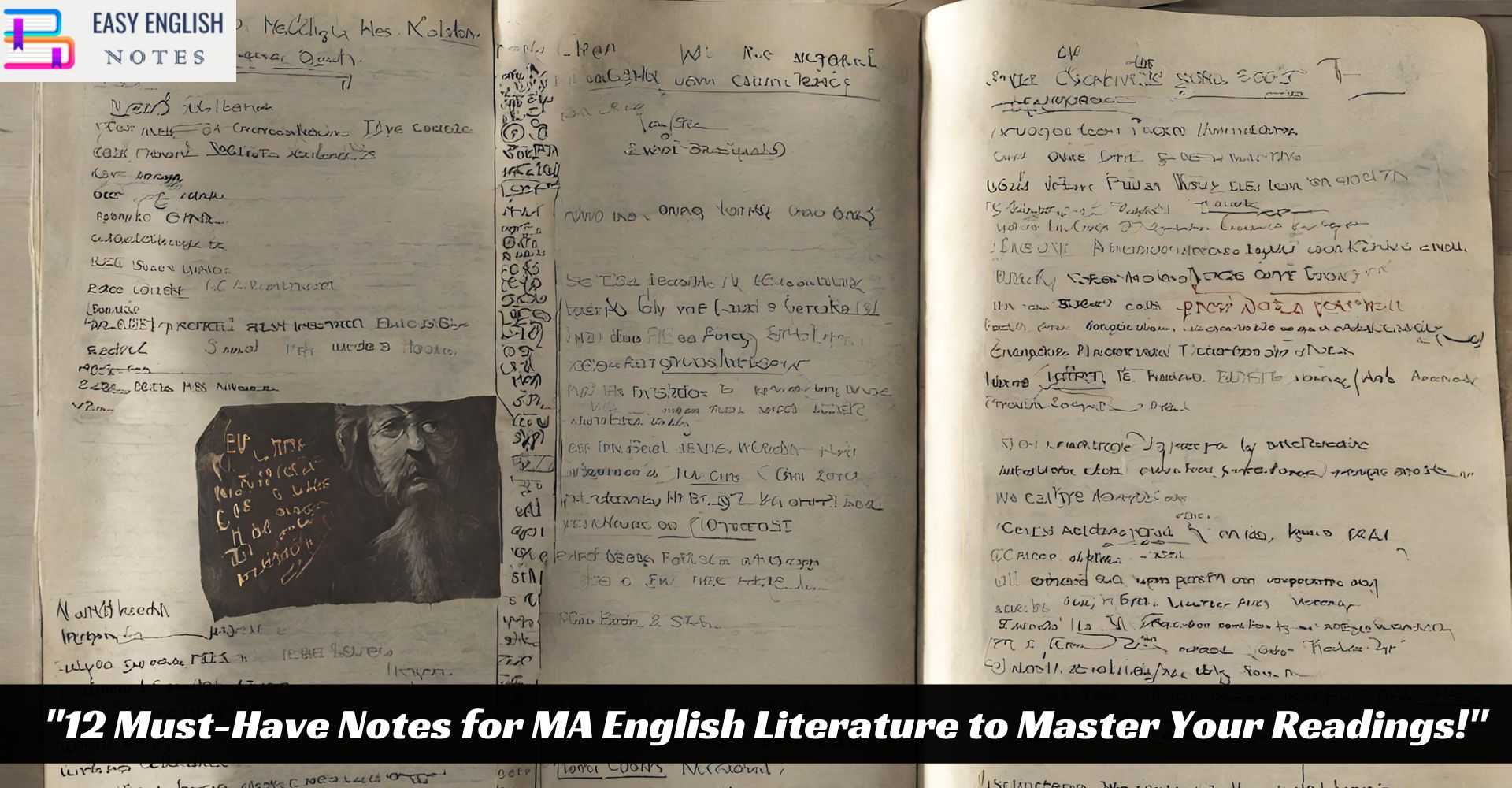Embarking on your MA in English Literature journey? Feeling overwhelmed by the vast ocean of texts, theories, and critical analyses? We’ve all been there, and the key to navigating this literary labyrinth lies in having the right tools at your disposal. That’s where “12 Must-Have Notes for MA English Literature to Master Your Readings!” comes into play. These aren’t just any notes; they are your secret weapon to unlocking the themes, motifs, and historical contexts that make each piece of literature a treasure trove waiting to be discovered. Imagine having a guide that not only simplifies complex ideas but also ignites your passion for literary exploration. These notes for MA English literature are designed to do just that, transforming daunting readings into engaging, insightful discussions. Ready to elevate your literary analysis and discussion skills to a whole new level? Let’s dive into these indispensable notes that promise to enrich your understanding and appreciation of English literature like never before.
Embarking on a Master’s in English Literature is like setting sail into a vast sea of narratives, theories, and historical contexts. It’s a journey both exhilarating and daunting, where each text offers a world to explore and understand. Whether you’re dissecting the intricate layers of Victorian novels or untangling the complex verses of modern poetry, the right preparation can turn these challenges into your greatest adventures. That’s where this guide comes into play, offering you “12 Must-Have Notes for MA English Literature to Master Your Readings!” These notes aren’t just scribbles on a page; they’re your compass and map, guiding you through the literary landscapes you’ll encounter.
Google Ads PPC Training Digital – membership area
An Exclusive Blood Sugar Balancing And Weight Loss
1. Historical Contexts and Backgrounds
Understanding the era in which a piece was written is crucial. It’s not just about dates and events; it’s about grasping the social, political, and cultural currents that influenced the author. This knowledge adds depth to your readings, making characters and narratives more relatable and profound.
2. Author Biographies and Literary Movements
Get to know the authors not just as names on a page, but as real people with lives that shaped their writing. Understanding their personal journeys and how they fit into broader literary movements adds layers to your interpretation of their work.
3. Key Themes and Motifs
Keep an eye out for recurring themes and motifs that drive the narrative. Whether it’s the clash between nature and industrialization in Romantic poetry or the exploration of identity in postcolonial literature, recognizing these elements enriches your comprehension and analysis.
4. Character Analysis
Dive deep into character development and relationships. What motivates them? How do they evolve? Characters are the heart of literature, and understanding them on a deeper level brings the text to life.
5. Symbolism and Imagery
Literature is rich with symbols and imagery that serve deeper meanings and themes. Learning to identify and interpret these elements unlocks the emotional and intellectual richness of the text.
Also Read :
- Compare Hamlet with Macbeth, Othello and other Tragedies
- “The Pardoner’s Tale” is the finest tale of Chaucer
- Prologue to Canterbury Tales – (Short Ques & Ans)
- Confessional Poetry – Definition & meaning
- Line By Line Explanation Of The Poem The Eve of St. Agnes
6. Critical Perspectives
Familiarize yourself with various critical approaches—feminist, Marxist, psychoanalytic, etc.—to analyze texts. These perspectives offer diverse lenses through which to view and critique literature, adding richness to your academic discussions and writings.
7. Comparative Analysis
Drawing parallels between texts, authors, or literary periods fosters a broader understanding and appreciation of English literature. It’s like connecting the dots across the literary universe, revealing intricate patterns and relationships.
8. Quotations and Key Passages
Collecting pivotal quotations and passages aids in supporting your arguments and analyses in essays and exams. These snippets encapsulate core themes and ideas, serving as evidence for your scholarly interpretations.
9. Genre and Form
Whether it’s the tight structure of a sonnet or the sprawling narrative of a novel, understanding the conventions and innovations of different genres and forms is key to appreciating their craft and impact.
10. Literary Devices and Techniques
Metaphor, alliteration, stream of consciousness—these are just a few of the tools authors use to convey meaning and emotion. Recognizing and understanding these techniques enhance your ability to interpret and enjoy literature.
11. Reader Response and Interpretation
Embrace the subjectivity of literary interpretation. Your unique perspective adds valuable insights to discussions and analysis, enriching the collective understanding of a text.
12. Research and Scholarly Sources
Leveraging academic resources, from journals to literary critiques, supports your studies with expert insights and evidence. These sources deepen your knowledge and provide a solid foundation for your academic work.
Incorporating these “Notes for MA English Literature” into your study routine transforms your reading experience. It’s not just about consuming texts; it’s about engaging with them, questioning them, and ultimately, understanding them on a level that resonates both intellectually and emotionally. Literature is a dialogue, and with these notes, you’re not just listening; you’re participating.
Let these notes be your guide as you navigate the complex yet captivating world of English literature. They will not only assist you in mastering your readings but also in developing a critical and appreciative lens through which to view all literature. So, as you embark on this academic journey, remember that these notes are more than just aids; they are stepping stones to a deeper, more profound engagement with the rich tapestry of English literature. Happy reading!











